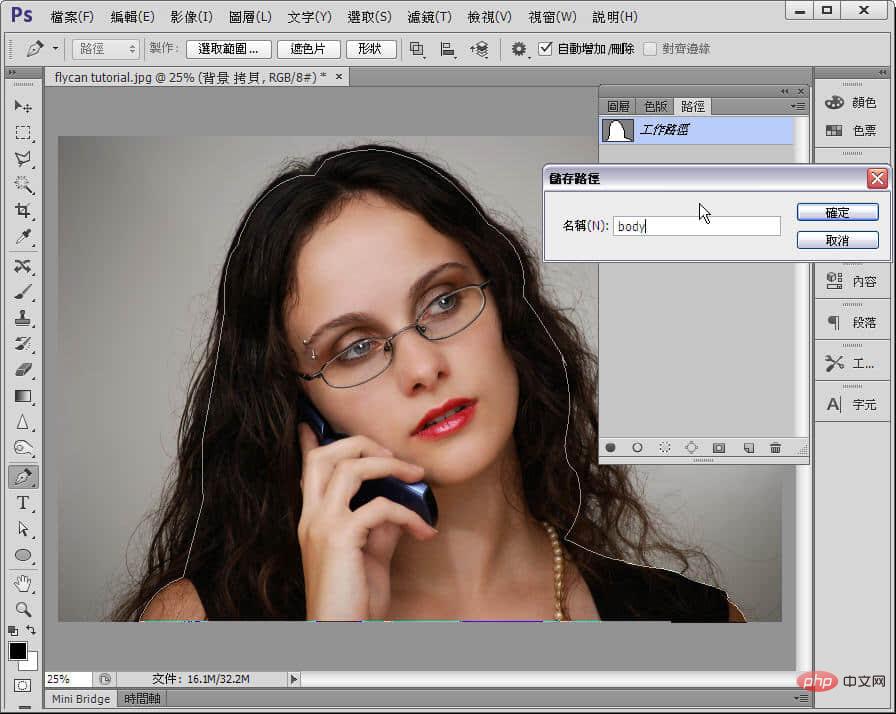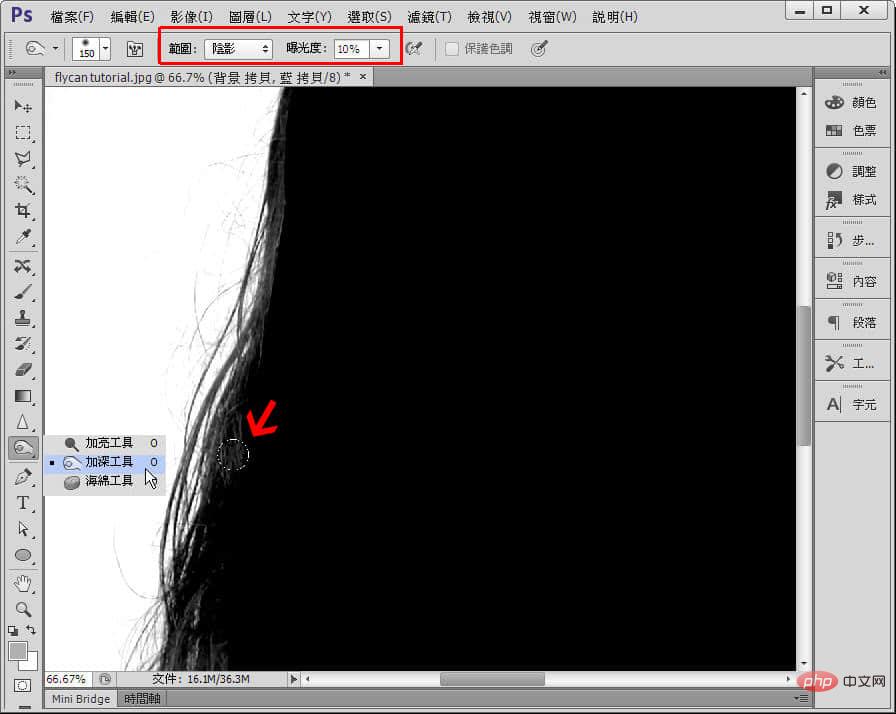How to button hair in PS

[Step 1] Open the file in Photoshop
First, open the file you just downloaded in Photoshop. After opening, you can choose to go to the layer panel and double-click the image. The layer name can be used to unlock it, or copy a new layer to use like we did;
The advantage of the latter is that because all post-production is applied to the copied layer, you don’t have to worry about it. The original image file is destroyed, and sometimes it is necessary to compare the before and after with the original image file. At that time, if this layer of insurance is performed, it will be very convenient for inspection.

[Step 2] Use the "Pen Tool"
First, select the "Pen Tool" and note that the options panel above should be displayed as " "Path" instead of "Shape", then start to slowly trace the main outline of the character using the "click~pull~point~pull~" method;
(Note: If you are not familiar with pen tools Friends, you can refer to Feiken’s previously shared teaching articles: "Pen Tool" and "Path" to memorize - introductory chapter!)
The hair part needs to be left for special processing later, so Don't select it yet; after selecting it, a complete white solid line range will appear. (As shown in the picture below)

At this time, open the path panel, and the "working path" we just made will appear. Remember to double-click it and name it to save, otherwise it will be hard to use. If you drag the mouse for a long time and finally forget to save it, you will have to do it all over again.

[Step 3] Use Alpha Channel "Color Version" to memorize
At this time, click on the "Color Version" panel, please observe carefully where it is Under one color palette, will the contrast between the dark and bright parts of the character and the background be greater? !
After selecting, we will make a copy of the color version that appears to have greater contrast (that is, clear black and white). This newly copied color version is generally called the alpha channel color version. In this example, we will find that in the blue color version, the black of the model's hair is more clearly distinguished from the gray of the background, so we finally chose blue. color swatches.

Then go back to the "Path" panel and click the "Load path as selection range" button at the bottom of the panel (marked in red as shown in the picture), you can The saved path becomes selected;
At this time, fill the selection range with black (if the foreground color has been set to black, you can use the shortcut key "Alt Delete").

Next, we can use the Levels panel to move the white eyedropper to the background and click it. The background can be initially grayed out and whitened. (As shown in the picture);
At this time, the black and white contrast of the entire picture is more obvious. If some areas are still not white enough, it doesn’t matter. We will use other tools to process it in the next step.

[Step 4] Photoshop’s “Burn Tool”
In order to make the hair part darker, here we use Photoshop’s “Burn Tool” "Tool", remember to set the range of the upper option panel to "Shadow", and the exposure can be set to 10% or slightly less than 10%;
As for the size of the brush, adjust it to the appropriate one To determine the size, we only need to lightly brush the edges of the hair a few times, and there is no need to apply too heavy a treatment to avoid adverse effects.

Of course, after using the "Burn Tool", on the contrary, we can use the "Highlight Tool" to enhance the areas where the background is not white enough, or where the hair and the background meet. at.
Also need to pay attention to the options panel above. Please set the range to "Highlights" and the exposure to about 10% or slightly less than 10%.
After the above operation, you should be able to get a silhouette-like effect as shown below:
【Step 5】Load the color plate as the selection range
Since the valid range in the "color plate" is the white part, we first use the shortcut key " Ctrl I" to invert the silhouette in black and white, and then click the "Load Color Version as Selection Range" function at the bottom of the panel to make a direct selection.
Then, return to the "Layer Panel" and use the selection range of the color version just now to make a copy directly on the layer (the shortcut key is "Ctrl J") .
What is copied is the layer file that has been memorized.
[Step 6] Trim the edges after removing the backing
If it is an object with simple lines, remove it roughly It's almost finished here, but because the hair is thin and messy, we can find that under the red background, the edge is close to translucent and it doesn't feel natural enough.
At this time, we still have a little tip to teach you. Please use the "Layer/Trim/Remove White Edge Blending" function to make final touches. White edge action; as long as you learn this function, if you find that the edge is still not clean enough after removing the white background (or light-colored background), you can usually achieve a certain modification effect.
(Note: If the original background is black, use "Remove Black Edge Blending".)
Change the background for viewing After removing the red color, you can save this back-removal picture for later use!
For more technical articles related to PS issues, please visit the PS Tutorial column to learn!
The above is the detailed content of How to button hair in PS. For more information, please follow other related articles on the PHP Chinese website!

Hot AI Tools

Undresser.AI Undress
AI-powered app for creating realistic nude photos

AI Clothes Remover
Online AI tool for removing clothes from photos.

Undress AI Tool
Undress images for free

Clothoff.io
AI clothes remover

Video Face Swap
Swap faces in any video effortlessly with our completely free AI face swap tool!

Hot Article

Hot Tools

Notepad++7.3.1
Easy-to-use and free code editor

SublimeText3 Chinese version
Chinese version, very easy to use

Zend Studio 13.0.1
Powerful PHP integrated development environment

Dreamweaver CS6
Visual web development tools

SublimeText3 Mac version
God-level code editing software (SublimeText3)

Hot Topics
 How to set password protection for export PDF on PS
Apr 06, 2025 pm 04:45 PM
How to set password protection for export PDF on PS
Apr 06, 2025 pm 04:45 PM
Export password-protected PDF in Photoshop: Open the image file. Click "File"> "Export"> "Export as PDF". Set the "Security" option and enter the same password twice. Click "Export" to generate a PDF file.
 What are the common questions about exporting PDF on PS
Apr 06, 2025 pm 04:51 PM
What are the common questions about exporting PDF on PS
Apr 06, 2025 pm 04:51 PM
Frequently Asked Questions and Solutions when Exporting PS as PDF: Font Embedding Problems: Check the "Font" option, select "Embed" or convert the font into a curve (path). Color deviation problem: convert the file into CMYK mode and adjust the color; directly exporting it with RGB requires psychological preparation for preview and color deviation. Resolution and file size issues: Choose resolution according to actual conditions, or use the compression option to optimize file size. Special effects issue: Merge (flatten) layers before exporting, or weigh the pros and cons.
 How to use PS Pen Tool
Apr 06, 2025 pm 10:15 PM
How to use PS Pen Tool
Apr 06, 2025 pm 10:15 PM
The Pen Tool is a tool that creates precise paths and shapes, and is used by: Select the Pen Tool (P). Sets Path, Fill, Stroke, and Shape options. Click Create anchor point, drag the curve to release the Create anchor point. Press Ctrl/Cmd Alt/Opt to delete the anchor point, drag and move the anchor point, and click Adjust curve. Click the first anchor to close the path to create a shape, and double-click the last anchor to create an open path.
 What is the reason why PS keeps showing loading?
Apr 06, 2025 pm 06:39 PM
What is the reason why PS keeps showing loading?
Apr 06, 2025 pm 06:39 PM
PS "Loading" problems are caused by resource access or processing problems: hard disk reading speed is slow or bad: Use CrystalDiskInfo to check the hard disk health and replace the problematic hard disk. Insufficient memory: Upgrade memory to meet PS's needs for high-resolution images and complex layer processing. Graphics card drivers are outdated or corrupted: Update the drivers to optimize communication between the PS and the graphics card. File paths are too long or file names have special characters: use short paths and avoid special characters. PS's own problem: Reinstall or repair the PS installer.
 How to solve the problem of loading when PS is always showing that it is loading?
Apr 06, 2025 pm 06:30 PM
How to solve the problem of loading when PS is always showing that it is loading?
Apr 06, 2025 pm 06:30 PM
PS card is "Loading"? Solutions include: checking the computer configuration (memory, hard disk, processor), cleaning hard disk fragmentation, updating the graphics card driver, adjusting PS settings, reinstalling PS, and developing good programming habits.
 How to speed up the loading speed of PS?
Apr 06, 2025 pm 06:27 PM
How to speed up the loading speed of PS?
Apr 06, 2025 pm 06:27 PM
Solving the problem of slow Photoshop startup requires a multi-pronged approach, including: upgrading hardware (memory, solid-state drive, CPU); uninstalling outdated or incompatible plug-ins; cleaning up system garbage and excessive background programs regularly; closing irrelevant programs with caution; avoiding opening a large number of files during startup.
 Photoshop's Value: Weighing the Cost Against Its Features
Apr 11, 2025 am 12:02 AM
Photoshop's Value: Weighing the Cost Against Its Features
Apr 11, 2025 am 12:02 AM
Photoshop is worth the investment because it provides powerful features and a wide range of application scenarios. 1) Core functions include image editing, layer management, special effects production and color adjustment. 2) Suitable for professional designers and photographers, but amateurs may consider alternatives such as GIMP. 3) Subscribe to AdobeCreativeCloud can be used as needed to avoid high one-time spending.
 Photoshop for Professionals: Advanced Editing & Workflow Techniques
Apr 05, 2025 am 12:15 AM
Photoshop for Professionals: Advanced Editing & Workflow Techniques
Apr 05, 2025 am 12:15 AM
Photoshop's advanced editing skills include frequency separation and HDR synthesis, and optimized workflows can be automated. 1) Frequency separation technology separates the texture and color details of images. 2) HDR synthesis enhances the dynamic range of images. 3) Automate workflows to improve efficiency and ensure consistency.














